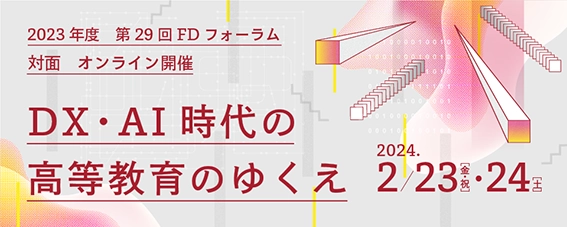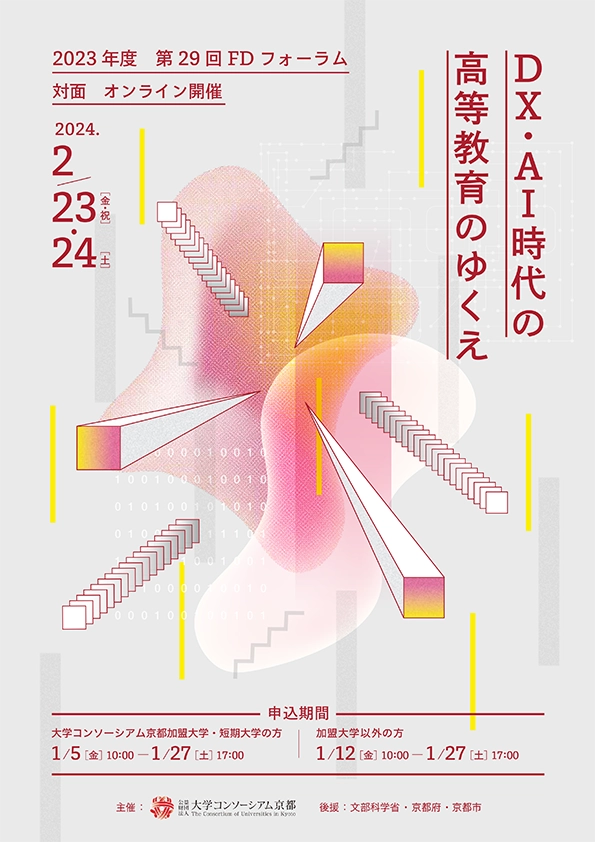Business summary
With the aim of raising awareness of FD among university faculty and staff and contributing to the improvement of university education, the University Consortium Kyoto has been holding an FD forum every year since 1995 with the themes of (1) disseminating FD activities, (2) providing a place for practical and research reports on university education and class improvement and for personal interaction, and (3) disseminating information on FD activities in Kyoto. This is a large-scale FD event attended by many university faculty and staff members and education-related personnel from all over the country.
Event Outline
The 29th FD Forum

- Main subject
- The Future of Higher Education in the Era of Digital Transformation and AI
- Date and Time
- February 23, 2024 (Friday, New Year) and February 24, 2024 (Saturday)
- Venue
- Campus Plaza Kyoto or Online (Zoom)
- Sponsor
- The Consortium of Universities, Kyoto
The 29th FD Forum leaflet can be downloaded here .

schedule
| schedule | time | content |
|---|---|---|
| February 23 (Friday) | 10:00~12:00 | 1st to 4th Divisional Meetings |
| 14:00~16:00 | Symposium | |
| 16:30~18:00 | Poster Session *Information exchange session will be held at the same venue (until 18:30) |
|
| February 24 (Saturday) | 10:00~12:00 | 5th to 8th Divisional Meetings |
| 14:00~16:00 | 9th to 12th Sessions |
Symposium
More details about the symposium can be found here .
|
Symposium
February 23 (Friday) 14:00-16:00
|
|
Looking into the learning continuum
: Seeking resistance and irreplaceability to generative AI Capacity: In-person: 230 people (member school priority capacity: 140 people)
Online: 1,000 people (600 people, priority for member schools)
|
In 1995, when a paper by Barr and Tagg was published, pointing out the paradigm shift from teaching to learning, the University Consortium Kyoto held the first FD forum, inspired by the book “Techniques of Knowledge” by the University of Tokyo Press. Thirty years have passed since then, and the rise of generative AI has made it necessary to reexamine the nature of learning environments. This forum focuses on several continua in the learning community, such as junior colleges and four-year universities, primary and secondary education to higher education, liberal arts education and specialized education, undergraduate and graduate schools, and universities and communities, and approaches the role of those who will play an important role in creating learning environments that cannot be replaced by AI, while also taking into account AI resistance from the perspective of symbiosis with generative AI.
|
Divisional meeting
Summary of all breakout sessions can be found here .
*You can apply for multiple subcommittees, but you cannot apply for subcommittees that have overlapping times. *If you are participating online, please be sure to check the “Online Participation Supplement” in the overview of each subcommittee
listed in the leaflet .
Poster Session
Faculty and students from member schools of the University Consortium Kyoto will present distinctive educational initiatives.
The poster session will be held in person only.
The outline of the posters will be updated from time to time.
Information (business card) exchange meeting
Date: February 23 (Friday) 16:30-18:30
An information (business card) exchange session will be held at the same venue as the poster session. Anyone who has applied for the symposium or subcommittee can participate. No prior application is required. Please feel free to join us.
Implementation Report
Report of the 29th FD Forum [Click here for details]
The 29th FD Forum was held over two days, February 23rd (Friday, holiday) and 24th (Saturday), 2024, with the main theme of “The Future of Higher Education in the Era of DX and AI,” combining face-to-face and online sessions.
The FD Forum, organized by the University Consortium Kyoto, has been held since 1995 with the aim of improving the quality of higher education and disseminating information on FD activities from Kyoto, and this year marks the 29th time it has been held.
This time, the issue was raised that in an era in which generative AI is effectively utilized, it is important to relearn the experience of DX, including the development of online classes during the COVID-19 pandemic, and each university reported on its efforts and practices regarding how to design a learning environment while ensuring continuity between learning places (universities and regions), school types (primary, secondary, and higher education, junior colleges and universities, undergraduate, master’s, doctoral, etc.).
Over the two days, 12 subcommittees, symposiums, poster presentations, and information exchange sessions were held on a variety of themes.
468 university faculty members and education-related personnel from across Japan gathered to share results and practices, and engaged in lively exchanges of opinions.
In the poster session held on the first day, a total of nine educational practice cases were presented by member schools of the University Consortium Kyoto. A total of 134 people, including 42 presenters, participated, and lively question and answer sessions were held. An information exchange session was also held at the same venue, providing a forum for participants to network with each other.
We welcomed a wide variety of presenters from various fields and held 12 subcommittees. This year, we switched from the online-based format of the previous year to a combination of face-to-face and online formats, and were able to develop a rich program over the two days, including lively discussions with participants. Meaningful exchanges were held between speakers and online participants using the chat function and question form.
The symposium was entitled “Looking into the Continuum of Learning – Seeking Resistance and Irreplaceability to Generative AI” and featured three speakers: Masaharu Imamura (President of Saga Women’s Junior College), Noriyuki Ueda (Vice President of Tokyo Institute of Technology), and Miki Horie (Professor at the College of Global and Interdisciplinary Studies, Ritsumeikan University / Principal of Ritsumeikan Elementary School) (Coordinator: Hironori Yamaguchi (Professor at the Institute for Promotion of General Education, Ritsumeikan University)). After reports from a wide range of perspectives, the coordinator moderated the general discussion, which involved as many comments and questions as possible being answered, making for a lively two hours.
The poster session was also attended by speakers from other subcommittees, and an information exchange session was held at the same venue, deepening interactions not only among the presenters but also among forum participants.
Contact Information
The Consortium of Universities Kyoto FD Forum Office
TEL: 075-353-9163 FAX: 075-353-9101
E-mail: fdf■consortium.or.jp (replace ■ with @)
Campus Plaza Kyoto, Nishinotoin-dori Shiokoji-sagaru, Shimogyo-ku, Kyoto 600-8216
*Reception hours: Tuesday to Saturday 9:00-17:00 (excluding New Year’s holidays)















